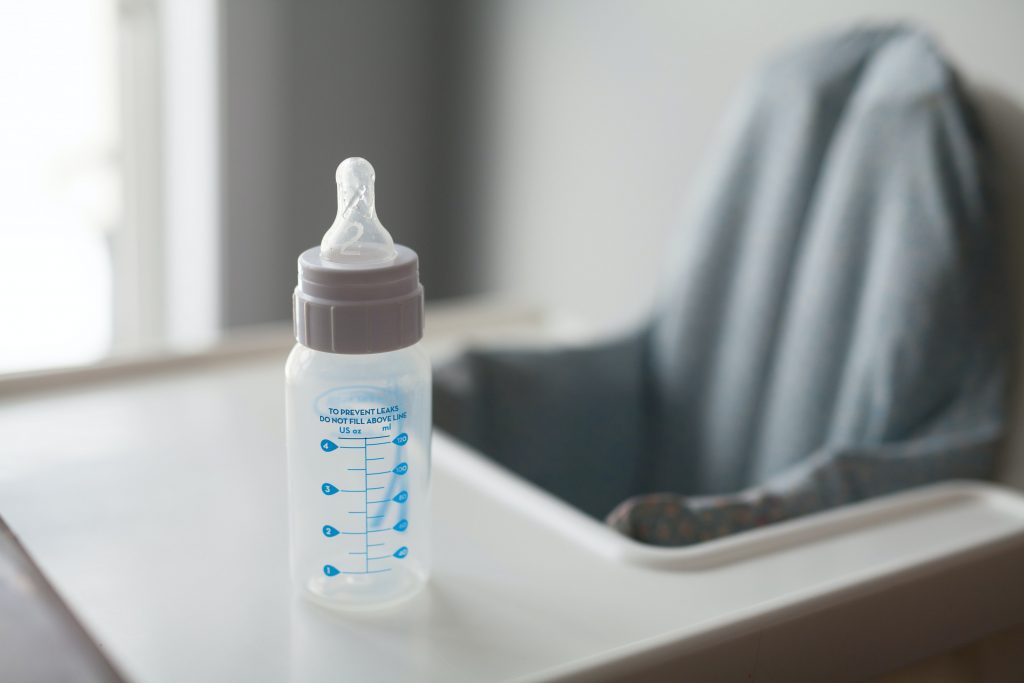It can take a few days for formula-fed babies to get used to a change in their milk. This is called "feeding adaptation." Your baby will show you when she's ready to try the new formula by showing signs of fullness or maybe spitting up more often. She may also get diarrhea, but this isn't related to the type of milk you're giving her. Sometimes it can lead to problems with sleep because your newborn may have spasms and other stomach issues.
Many babies get an upset tummy if they go from breast milk to formula or even if they wean completely off the bottle and change at that point. And what should you know when your baby tries to adjust to formula change?
Why do babies take so long to adjust to formula change?
When your infant first starts drinking cow's milk or soy formula, he may not like the taste at first but will adjust quickly because of all the good stuff in these kinds of milk. But if he has had some experience with breastfeeding and then swifts to a lower-fat type, his tummy might have trouble when you try to adjust the infant to the change since breast milk contains fatter than many other types of baby formula. This doesn't mean that low-fat milk is bad for your baby, just that it may take him a little longer to get used to it.
Babies can have an upset tummy when they change formula types because their guts are sensitive. It's not good to give babies who are gassy or nauseated any kind of medication unless they're also constipated, so look out for signs of this before you start giving her anything other than gripe water or infant gas drops.
Read on for helpful hints in switching your baby's formula safely and smoothly:
- Switching between brands: If you've been using one brand and change(either because that kind of milk is out of stock, you're out of that brand/flavor, etc.), just mix the new formula with the old one before you stop using it so your baby gets used to the change gradually.
- Change types of formulas: For example, if you were using soy formula and change to cow's milk-based formula, do it slowly. Mix more of the new kind of formula with less of the old kind every day until your baby is drinking mostly (if not all) the new type. If you have been mixing the powder with liquid in equal parts and switch completely to a brand that comes premixed, give her about half as much premixed as she'd been getting mixed (so adjust accordingly if your child`s formula comes premixed with the amount you're supposed to mix with twice as much water).
- Change types of bottles: If your baby is used to one type of bottle, switching to another will delay this process because she'll need time to get used to something different in her mouth. But if you've been using Dr. Brown's and switching to Playtex drop-ins, Jack-Jack can make up for the lost time by drinking from both with ease since they are similar. He might gasp a bit when he drinks from the new kind at first, but that's normal.
- Switching between formula feeding and breastfeeding or pumping: This usually just takes some more prep on your part before you start trying again.
Best time for changing the new formula
It is recommended to do it in the evening, because if your baby has an unpleasant experience with a new kind of milk, he may wake up during the night and won't sleep well. If you change his diet at breakfast or lunchtime, most likely he will go to bed without feeding and will be hungry at night which negatively influences his rest and health as a whole.

Also, we know that babies usually eat more frequently than adults and older kids. It helps them sleep well and keep as many calories as they need for growth. So don't think swapping formulas is hard for your child just because it is hard for you. It is a bit unusual to require a lot of patience, but don't forget it's a good investment for your baby.
Is it safe for a baby?
Yes. Whenever you need to change formulas, give her as much as she wants for as long as it takes her to feel full and satisfied—usually about a week. Then gradually decrease the amount until you're back on track with your original routine.
Of course, depending on how long you try to change, you may go through a lot of bottles. So it's probably best to wait until your baby is at least 4 months old—when she can start drinking from a cup—to make the change and adjust to it.
Also, if this process takes too long, your child may not get the proper nutrition she needs, which can have serious consequences. So if you're struggling, or if your baby doesn`t want to adjust after a week, talk to your doctor. They can help you figure out what to do next.
How long should I wait before your baby will adjust?
It might take about a week if everything goes well with the transition. Try not to rush it since it'll go more smoothly if you properly adjust the kid to another type of milk instead of comfortable halfway between. If you find yourself rushing the process, you can always stop for a few days and then start again at the halfway point.
In general, the adjust process to the new formula won't be too difficult since the infant`s tummy is still very small. Just remember to go slowly, watch for any signs of discomfort, and consult with your pediatrician if you have any concerns. With a little patience, your baby will be enjoying her milk in no time!
However, there are some cases when a baby can't or shouldn't drink cow's milk-based formula. Your doctor will be able to advise you on what's best for your little one. They will also be able to help in case you feel that your baby doesn`t want to adjust to the formula change.
How can you make the adjustment to formula change easier?
If your kid has trouble and doesn`t adjust to the new formula, there are a few things you can do to make it easier. First, try slowly mixing the new and old formulas together. Start by adding just a little bit of another type of milk to her old milk and gradually increasing the amount over a period of days or weeks. Kids should adjust as naturally as possible.
You can also try switching the time of day when you give her the new formula. For example, if she typically drinks cow's milk-based formula in the morning, switch to giving her another formula at night. Then gradually start giving her another milk in the morning as well. In such a case formula change would be long, but more effective. Moreover, nice feeding is equal to nice sleep for your newborn!
Finally, make sure that you're prepared for some trial and error. It may take a few tries before you find a method that works for your baby. So don't get discouraged if the first few attempts don't go as planned. Just keep trying and consult with your pediatrician if you need help. The long process will bring you better results!

Is there anything else I should know?
As long as your baby is eating properly, gaining weight, and has plenty of wet diapers, she's getting enough formula to not worry about how long it takes her to adjust. If she doesn't seem satisfied with her feedings or if she won't eat very much every day, check with the doctor before switching types. Of course, if your baby throws up after drinking something different or keeps having diarrhea, call the doc since this could be a sign of an allergy.
Allergy
Allergies' danger to babies can be high, so it is crucial to know the difference between normal digestive issues and an actual allergy. If you think your baby might have trouble handling milk-based formula, talk to your doctor to see if she needs a soy version instead.
Allergies to formula can be a lot more serious than your baby just not feeling good after drinking it, so don't wait to call the doctor if you notice anything different in her behavior or health.
Doctors` recommendations
Be sure to consult your pediatrician if you think there might be an issue with your infant`s formula. If the doctor recommends switching the diet of your baby, you need to ask about a type of formula. If your doctor recommends switching to whole-milk formula, ask them if it is possible for you to use 2%. Your baby may not like the taste of it. Your pediatrician knows your child better than anyone else. Even if the adjustment process is long, keep going and you will get the results!
Bottom line
Remember that your baby's tummy is a lot more sensitive than yours, so you will have to give her time before she gets used to the new formula. These things take time and patience, but it'll be worth it for both of you. We can not tell exactly how long will it take for your baby to adjust to formula change, but if you do everything correctly, you will see the results asap.